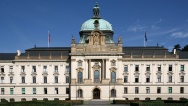Press Advisories
30. 4. 2014 21:18
Prime Minister Bohuslav Sobotka’s address at a business forum marking the Czech Republic’s 10 years of EU membership
It is a genuine pleasure for me to attend this business forum on the same panel as Mr Herman Van Rompuy. After this conference, we will have a chance to have a working lunch together and directly address issues specific to our membership of the European Union.
I would like to start on a personal note. I was the finance minister in Vladimír Špidla’s government ten years ago, at a time when we were finalising preparations for accession to the European Union. As fate would have it, ten years down the line I have returned to a high constitutional post, giving me the opportunity to witness first-hand as we celebrate and take stock of the tenth anniversary of EU accession. I am pleased that we are able to commemorate this anniversary in the Czech Republic with numerous prominent EU representatives, including President Herman Van Rompuy today and, just the other day, Martin Schulz – the President of the European Parliament.
I am convinced that Europe is a unique integration project based on unquestionable cooperation and solidarity. One of the pivotal achievements of the European Union, a project to which we have been able to contribute for the past decade, is that it has guaranteed enduring peace, stability and democracy in an integrated part of the continent. Before arriving at such a solution, Europe frequently had to weather bloody experience, which rose to a crescendo in the 20th century. It gives me great satisfaction that the Czech Republic can also be involved in such a durable project of peace today.
European integration is also a gateway for European countries to lock horns in the arena of global competition. The ordeal of the past few years of financial crisis has shown that those European countries able to couple the free market seamlessly with a strong welfare state, such as Germany, Austria and the Scandinavia group of countries, are most resistant to fluctuations in the global market.
These countries are also identified as leaders in international comparisons of competitiveness.
The European Union is strong and unique thanks to its ability to combine a single internal market with high social standards, which keep the population’s purchasing power buoyant and form a strong middle class. The single internal market and the free movement of people, goods and capital generate keener competition across the EU and promote healthy growth. The welfare state, for its part, maintains the middle class, prevents or at least slows down the widening gap between rich and poor, and creates a cohesive society. A cohesive society is more resilient to economic and political pressures than one which is radically socially divided.
European Union membership represents our national interest reaching fruition, enabling us to wield much greater influence on events in the outside world. No longer are decisions taken about us without us, as was often the case in history. Now we are sitting at the same table as other European partners and sharing in decisions.
No one can deny that joining the European Union has moved us forward economically. Not only have we benefited from 333 billion from European funds in the past ten years, but our membership has also been a catalyst attracting major inflows of foreign direct investment. Our accession to the Union, a zone of stability, prompted numerous foreign investors to start viewing our country as a good place to do business.
Czech businesses, for their part, gained access to foreign markets. European Union countries now absorb more than 80% of Czech exports. If we trace developments in trade with Member States, we can see a significant increase in the last ten years.
As we look back at our decade of European Union membership, it is also important to note that we have yet to prove ourselves capable of taking full advantage of it. I am not referring just to the drawing of resources from European funds, which is a very sore point in the Czech Republic, particularly in terms of our ability to use these funds quickly and effectively.
Another issue is our inability to promote the Czech view and Czech interests on the European stage. As we clearly need to do something about this historical lack of aptitude, the new Czech Government is striving to return the Czech Republic to the mainstream of European integration, to the principles we were committed to when we entered Europe, to the principles of the active participation of our active membership.
Our country plainly needs to improve its competitiveness. European Union membership can be a boon in this respect. Mindful of this, we should grasp membership as a perfect opportunity and a vital challenge. A glance at tables comparing the competitiveness of individual countries is enough to see that the Czech Republic has slumped in recent years. Our problems lie in the quality of institutions, law enforcement, the fight against corruption, and standards in the business environment.
I would like to take this opportunity to promise that the new Czech Government will soon prepare a strategy plotting a path back up the competitiveness rankings. This strategy should define weaknesses and determine where the Government can lend a hand through good governance. It should be a strategy reached against a backdrop of social dialogue.
The European Union’s future energy policy is also important for competitiveness and must not drive industry out of Europe. This is a matter that has become particularly topical this year, and the outcome of the European debate, which will come to a head this year, will also have a major bearing on Czech competitiveness.
Public and private investment in science, research and innovation, along with investment in better education, including technical and vocational education, will also be important, and this is an issue I am keen to emphasise in the light of the adverse situation on our job market.
European funds must also make effective contributions to increased competitiveness between 2014 and 2020. The Czech Government is at a stage where, having approved the Partnership Agreement, we are preparing individual operational programmes, partly with an eye on how they can help the Government to achieve its primary objectives – to foster economic growth, increase employment and promote the competitiveness of the Czech Republic.
The new Operational Programme Enterprise and Innovation for Competitiveness, as currently under preparation, will concentrate on increasing the number of companies with the wherewithal to push the technological envelope in their field. An emphasis will be placed on developing business innovation capacities and partnering them with universities and other research institutions.
It is equally important, in the period from 2014 to 2020, for money from European funds to be channelled into improving public transport and infrastructure, to support less-favoured regions and to help to guide them away from doomed business practices.
The recent economic crisis, the repercussions of which are still reverberating, the parlous social situation in some European Union countries, and the political and security crisis just across the way in Ukraine all go to show that Europe is a living organism which, while resilient and viable, is decidedly difficult to programme. This increases our responsibility as regards the political decisions we take here in the Czech Republic, how active a role we play in the Union, and what economic and political diplomacy we promote in relation to the European Union. We can mould Europe only by joining forces, because we are all Europeans. It is time we ventured forth with fresh determination and renewed energy.






